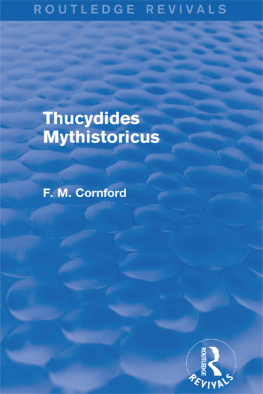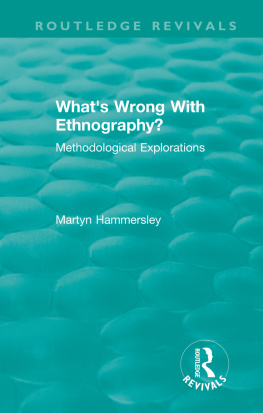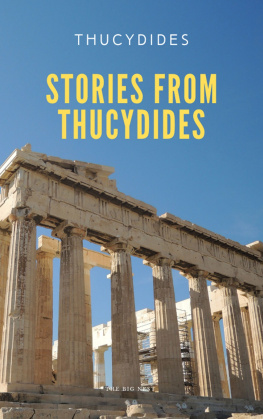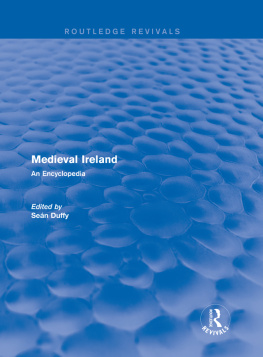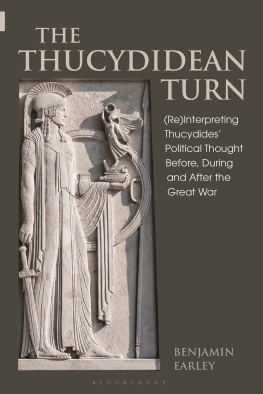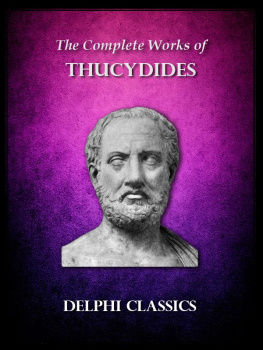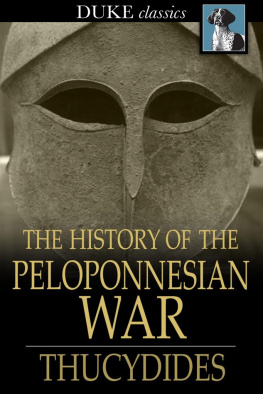First published in 1907
by Edward Arnold
Reissued 1965
by Routledge & Kegan Paul Ltd
This edition first published in 2014 by Routledge
2 Park Square, Milton Park, Abingdon, Oxon, OX14 4RN
and by Routledge
711 Third Avenue, New York, NY 10017
Routledge is an imprint of the Taylor & Francis Group, an informa business
1965 Routledge & Kegan Paul Ltd
All rights reserved. No part of this book may be reprinted or reproduced or utilised in any form or by any electronic, mechanical, or other means, now known or hereafter invented, including photocopying and recording, or in any information storage or retrieval system, without permission in writing from the publishers.
Publishers Note
The publisher has gone to great lengths to ensure the quality of this reprint but points out that some imperfections in the original copies may be apparent.
Disclaimer
The publisher has made every effort to trace copyright holders and welcomes correspondence from those they have been unable to contact.
A Library of Congress record exists under LC control number: 65029354
ISBN 13: 978-1-138-02483-0 (hbk)
ISBN 13: 978-1-315-77546-3 (ebk)
PREFACE
THE title of this book needs a word of explanation, if not of apology; for to any one who is accustomed to think of Thucydides as typically prosaic, and nothing if not purely historical, the epithet Mythistoricus may seem to carry a note of challenge, or even of paradox. But the sense in which the expression has here been used is quite consistent with the historians much-talked-of trustworthiness, and, indeed, with the literal truth of every statement of fact in the whole of his work. It is possible, however, even for a writer of history, to be something much better than trustworthy. Xenophon, I suppose, is honest; but his honesty makes it none the easier to read him. To read Thucydides is, although certainly not easy, at any rate pleasant, because trustworthiness and allhe is a great artist. It is the object of this essay to bring out an essentially artistic aspect of his work, which has escaped notice, partly because the history is so long that it is hard to take it in as a whole, and partly because the execution of the effect is imperfect, having been hindered by the good intentions with which Thucydides set out.
The history, as it stands, is the product of two hardly compatible designs. It was originally planned as a textbook of strategy and politics in the form of a journal; and it is commonly taken to be actually nothing more. But the work, in the course of its progress, began to grow, as it were of itself, out of this pedestrian plan into a shape with another contour, which, however, is broken by the rigid lines of the old plan, and discontinuous; much as a set of volcanic islands might heave themselves out of the sea, at such angles and distances that only to the eye of a bird, and not to the sailor cruising among them, would they appear as the summits of one and the same submerged mountain-chain. The present essay is mainly an attempt to chart these islands, leaving uncoloured blanks where the sea lies flat between them, and infringing none of the fishing-rights of the professed historian.
It is the intrusion of this artistic tendencyfor a thing so unpremeditated can hardly be called a designthat justifies the epithet Mythistoricus. By Mythistoria I mean history cast in a mould of conception, whether artistic or philosophic, which, long before the work was even contemplated, was already inwrought into the very structure of the authors mind. In every age the common interpretation of the world of things is controlled by some scheme of unchallenged and unsuspected presupposition; and the mind of any individual, however little he may think himself to be in sympathy with his contemporaries, is not an insulated compartment, but more like a pool in one continuous mediumthe circumambient atmosphere of his place and time. This element of thought is always, of course, most difficult to detect and analyse, just because it is a constant factor which underlies all the differential characters of many minds. It was impossible for Dante to know that his scheme of redemption would appear improbable when astronomy should cease to be geocentric. It is impossible for us to tell how pervasively our own view of the world is coloured by Darwinian biology and by the categories of mechanical and physical science. And so it was with Thucydides. He chose a task which promised to lie wholly within the sphere of positively ascertainable fact; and, to make assurance double sure, he set himself limits which further restricted this sphere, till it seemed that no bias, no preconception, no art except the art of methodical inquiry, could possibly intrude. But he had not reckoned with the truth that you cannot collect facts, like so many pebbles, without your own personality and the common mind of your age and country having something to say to the choice and arrangement of the collection. He had forgotten that he was an Athenian, born before Aeschylus was dead; and it did not occur to him that he must have a standpoint and outlook from which the world, having a long way to travel in a thousand or two thousand years, would drift far indeed. Thus it came about that even his vigilant precaution allowed a certain traditional mode of thought, characteristic of the Athenian mind, to shape the mass of facts which was to have been shapeless, so that the work of science came to be a work of art. And, since this mode of thought had, as we shall see, grown without a break out of a mythological conception of the world of human acts and passions, which is the world of history, I have given him the epithet Mythistoricus.
This essay, although its argument (of which a summary will be found in the Table of Contents) is continuous, has been divided into two parts which in a way reflect the twofold design of Thucydides history. Having occasion to look into the question, how the Peloponnesian War arose, I felt, vaguely but strongly, that Thucydides account of its origin is remarkably inadequate; and I came to form a very different theory of the real causes of the war. This theory I have stated in the first four chapters, because, although the subject seems to me to be of no great importance in itself, it led me to inquire further, why Thucydides has told us about this matterand told us at considerable lengthso exceedingly little that appears to us relevant. The rest of the book is an answer to this question. I found that the reason lay, not in the authors famous reticencehe thought he had recorded all we should want to knowbut in the fact that he did not, as is commonly asserted, take a scientific view of human history. Rather he took the view of one who, having an admirably scientific temper, lacked the indispensable aid of accumulated and systematic knowledge, and of the apparatus of scientific conceptions, which the labour of subsequent centuries has refined, elaborated, and distinguished. Instead of this furniture of thought, to the inheritance of which every modern student is born, Thucydides possessed, in common with his contemporaries at Athens, the cast of mind induced by an early education consisting almost exclusively in the study of the poets. No amount of hard, rational thinkingan exercise which Thucydides never intermittedcould suffice to break up this mould, in an age when science had as yet provided no alternative system of conception. The bent of his poetical and artistic nurture comes out in the mythistorical portions of the work, which in the later chapters I have singled out and put together. The principle which informs and connects them is the tragic theory of human naturea traditional psychology which Thucydides seems to me to have learnt from Aeschylus. I have tried to show at some length how the form of the Aeschylean drama is built upon this psychology; and, finally, I have traced the theory of the tragic passions back into that dim past of mythological belief out of which it came into the hands of the Athenian dramatists. So my original question finds its answer. Thucydides never understood the origin of the war, because his mind was filled with preconceptions which shaped the events he witnessed into a certain form; and this form chanced to be such that it snapped the causal links between incidents, in the connexion of which the secret lies.



